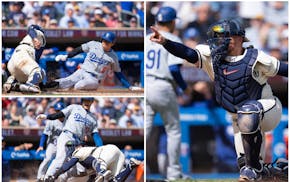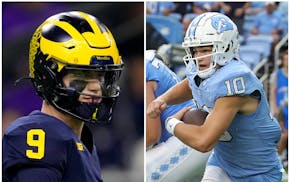Jared Allen remembers the first time he met Deacon Jones. It happened at an NFL alumni function a few years ago in a roomful of big men, big personalities and big egos.
The crowd snapped to attention when Deacon strolled in.
"I think the biggest thing about Deacon was what you saw on NFL Films, kind of that dominating presence," Allen said. "That's the way he was in that room."
Allen introduced himself to Jones and shared some casual conversation, one of the NFL's best current pass rushers starstruck by the guy who turned defensive end into a glamor position in modern football.
"That dude could talk, and he was hilarious," Allen said. "There was an aura in the room when he walked in. People wanted to go say hi to Deacon Jones. He's an icon in this sport."
Jones died this week at age 74, leaving behind a larger-than-life legacy as a man's man who terrorized quarterbacks with relentless pursuit and tormented offensive lineman with punishing slaps to the noggin.
Great athletes leave their mark in every generation, but the true marvel rests with those who change their sport, which is what Jones did. He became a pioneer, someone who made the term "sack" part of football's lexicon. Jones coined the phrase "sacking the quarterback," which paved the way for sacks being kept as an official statistic in 1982. His head slaps on linemen were so violent and dangerous that the NFL eventually outlawed that tactic.
Allen was mesmerized by images of Jones on NFL Films. Just as some kids imitated Michael Jordan by sticking their tongues out, Allen loved the ruthlessness of Jones' head slap.
"You have to make a rule because he's beating them so bad," Allen said. "[The head slap] was awesome. I used to get away with it in practice in college. Just ear-holing dudes."
Thankfully, the NFL is a safer operation these days and player health actually means something. But Jones revolutionized his position, and every defensive end who plays the game should be forever grateful, especially when they deposit their paycheck. That fact is not lost on Allen, who is set to make $14.2 million this season as one of the NFL's premier sack artists.
"Think about it, every [defensive end] that gets paid now, what do they look at — what are your sack numbers?" Allen said. "It's such a game-changing play. It can create so much havoc. If Deacon Jones doesn't create enough controversy and create sacking the quarterback as an actual stat, we're just looking at tackles."
That remains the mythical part of Jones' legacy. Nobody really knows how many sacks he collected in his career because the NFL didn't keep official count back then. Some estimate that Jones finished with more than 200 sacks, which would rank first in league history, ahead of Bruce Smith's official record of 200. Pro Football Weekly reportedly reviewed Jones' career and put his sack total at 194.5.
Allen wants the league to conduct its own study to determine the exact number, though he acknowledges any finding would be unofficial.
"I think it would be great to really go back and count sacks and see exactly where we all stack up," said Allen, who is at 117 sacks for his career. "I'm willing to bet that he's at the top of the list. I know a lot of guys would like to see where they measure up against those old guys. I know the game has changed and it's little different. But you can't deny what Deacon Jones did."
John Turney of the Pro Football Researchers Association reviewed play-by-play accounts and some game film and determined, in his estimation, that Jones finished with 173.5 sacks, which would put him third all time, behind Smith and Reggie White (198).
Turney credits Jones with 22 sacks in one season, the same number Allen posted in 2011 — a half-sack shy of Michael Strahan's league record.
Turney admits that Jones' total is a moving target (within a sack or two) because information from that era is not always reliable or readily available.
"That's why I felt they should never be official," he said. "I just want to know what the numbers are."
Allen's admiration goes deeper than statistics. He loves characters, guys who speak their mind and show some personality. Deacon Jones was a true original in that regard.
"I think the greatest part about him was, he was true to who he was," Allen said. "He did things his way. It's just cool to see a guy who's so genuine, and he obviously changed the game of football."
Chip Scoggins can be reached at chip.scoggins@startribune.com.

Scoggins: Finch feeling heat of the Suns as playoff battle looms
Scoggins: Why 'championship or bust' fits these Wolves

Scoggins: Anatomy of a game-saving play as Correa throws out Ohtani


